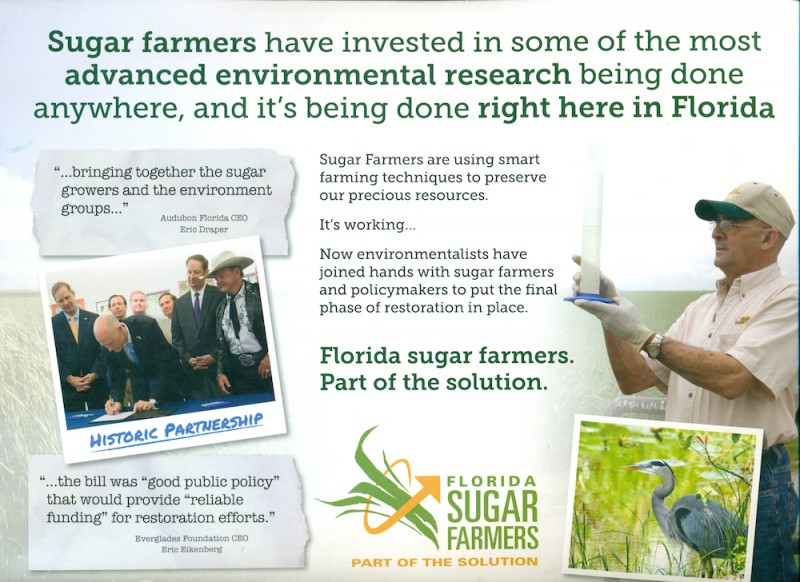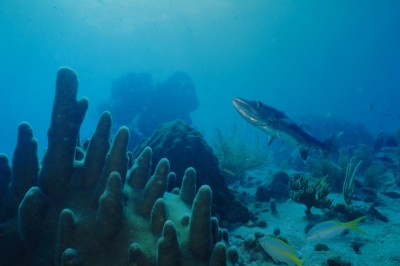Big Sugar Greenwashes Everglades Deal and Continues Dumping Harmful Nutrients
 Ad Bluster – Using targeted advertising and public relations campaigns to exaggerate an environmental achievement in order to divert attention away from environmental problems …
Ad Bluster – Using targeted advertising and public relations campaigns to exaggerate an environmental achievement in order to divert attention away from environmental problems …
— http://www.stopgreenwash.org/ (Greenpeace greenwashing website)
~~~~~~~~
A couple of weeks ago a mailer arrived in my mailbox. It ballyhooed the recent deal made among sugar farmers, the state of Florida, and several environmental groups and promoted what some refer to as Big Sugar. The deal provided substantial funding for Everglades restoration but also gave sugar farmers 30-year leases on their farms.
“Florida sugar farmers. Part of the solution,” it read. But what was this mailer? Who sent it out? And why? There is no group in the state listed as Florida Sugar Farmers as indicated in the return address. Nor did the mailer ask for any action on the part of the recipient the way political junk mail does.
And then about a week later a smaller version of the same direct mail piece arrived with essentially the same message. I asked around. Has anyone else received this? Since most people toss their junk mail, people I spoke to didn’t remember. But Mark Songer, former president of Last Stand, did get it and reacted with the same puzzlement.
“I was curious about those myself when they landed here,” Songer commented. “Obviously they were going to try to capitalize on the cooperation that the sugar growers had with the environmentalists in getting this compromise bill through in this legislative session. It was funny timing and I didn’t see the point of what they were sending around other than to make it look like they were not as bad a guys as everyone makes them out to be.”
Songer has experience on the issue because he serves as the Last Stand representative with a group of 60-some environmental organizations in what’s known as the Everglades Coalition.
So, are the sugar farmers still bad guys or have they indeed become part of the solution? As with any such issue, the answer to this is complicated. One of those quoted on the mailer is Eric Draper, CEO of Audubon Florida. The quotation on the card says, “…bringing together the sugar growers and the environment groups…” The ellipses in the quotation and the odd use of “environment” groups mandated a phone call. Turns out that what’s on the mailer is taken out of context and, as Draper says, is only half the story.
“I’m not sure why they sent it and they didn’t talk to me about it and as you can tell from the quote they only used a fraction of it,” Draper said. “I think I gave that comment after the signing of the Everglades water quality bill.”
While Draper and Audubon applaud the part of the agreement that includes $880 million from the legislature to continue the process of diverting fresh water into the Everglades, his organization has filed suit against Big Sugar.
“We’re in litigation with the sugar industry right now to try to compel them to do a better job of cleaning up the water that comes off their fields and in addition we believe they can do a much better job of conserving water. So we have two outstanding issues we’re trying to resolve with the sugar industry,” Draper added.”
The problem is phosphorous fertilizer and that problem flows right down to the Keys, damaging our reefs. In their suit, Audubon wants the sugar industry to stop dumping 5000 tons of phosphorous into the Everglades annually. They also point a finger at the South Florida Water Management District.
“We want to get a much better regulatory program because right now we believe the Water Management District that issues permits to the sugar farmers that discharge water into the public canals and then into the Everglades doesn’t do a very good job of requiring farmers to use Best Management Practices to control fertilizers,” Draper said.
Songer confirms that the fertilizer represents a serious problem for the Keys.
“Everything that comes from Orlando historically has flowed down south into the Florida Bay,” he said. “And when we get water with too many nutrients in Florida Bay it washes out to the coral reef and impacts that as well. So it’s not good for the bay. It’s the reason we get the algae blooms and too many nutrients in water where the coral are growing is not good for them either. They like very clear and low nutrient water.”
Reef Relief sees the same problems, listing a study on their website (www.reefrelief.org) that reveals that agricultural nutrients damage the reef. Seven scientists participated in a study that says, in part,
“Mass coral bleaching, resulting from the breakdown of coral–algal symbiosis has been identified as the most severe threat to coral reef survival on a global scale. Regionally, nutrient enrichment of reef waters is often associated with a significant loss of coral cover and diversity. Recently, increased dissolved inorganic nitrogen concentrations have been linked to a reduction of the temperature threshold of coral bleaching, a phenomenon for which no mechanistic explanation is available.”
The Florida chapter of Earth Justice had also gone to court to stop the deal that is promoted in the mailer. They were stymied by the legislature however.
According to their lead attorney Monica Reimer, their legal efforts were dismissed because the legislature passed legislation that removed the basis for the lawsuit. They just changed the law.
“We filed a lawsuit to challenge the 30-year leases and … we said they had to do an analysis to see if this was, in fact, in the public interest and if they applied their own regulations. What the legislature did was pass legislation which said issuing the leases for this long was in the public interest. This is what happens these days. Somebody connected with sugar if you’re in the bottom half of the state just goes to the legislature and they are just basically rewriting state laws left and right in order to prevent environmental lawsuits. What they are afraid they are not going to get through the courts they just go to the legislature.”
Reimer’s ironic comment is apt.
“We’re spending billions to clean up the Everglades at the same time that the governor and cabinet have decided that they want to be sugar cane growers.”
Everglades restoration is urgent. It’s long past time to get more fresh water into the system. On the plus side and to everyone’s credit, the agreement does require meeting effluent standards that are measurable. But if Big Sugar, or as the mailer calls them Florida Sugar Farmers, doesn’t radically improve its farming methods and doesn’t stop polluting everyone’s water, then the reefs will continue to suffer.
Coral reefs are not a tourist attraction; they provide critical phytoplankton that is at the bottom of the food chain in the ocean. If the coral dies, as it has been, then the entire eco system could collapse jeopardizing our entire fishing industry and food supply. And where will the Keys and its tourism industry be then?
